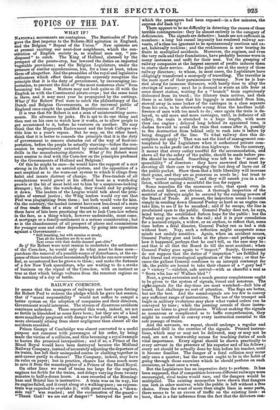TOPICS OF THE DAY.
WHAT IF?
Nieriowsz movements are contagious. The Barricades of Paris gave the first impetus to the Reform-Bill agitation in England,
and the Belgian " Repeal of the Union. New opinions are at present exciting our next-door neighbours, which the con- -stitution of English society is, as medical men say, " pre- disposed" to catch. The King of Holland, alarmed by the prospect of the potato-crop, has lowered the duties on imported vegetable provisions; and the Belgian Legislature, under the pressure of similar apprehensions, has, for a time at least, taken them off altogether. And the preambles of the royal and legislative ordinances which effect these changes expressly recognize the principle that it is the duty of government, by encouraging im- portation, to prevent the food of the most numerous class ' from becoming too dear. Matters may not look quite so ill with the English as with the Continental potato-crops ; but the same taint is there, and it may next year be propagated by the cuttings. What if Sir Robert Peel were to catch the philanthropy of the Dutch and Belgian Governments, as the universal public of England once caught the qualified Republicanism of Paris? It is true that Sir Robert is not a man of unintermitting move- ments. He advances by jerks. He is apt to do one thing and then rest on his oars to watch how it works, or to allow people to get accustomed to it, before he ventures on another. He may think that the Maynooth Endowment and the Irish Colleges en- title him to a year's repose. But he nul, on the other hand, think that it is better to concede the principle that it is the duty of government to remove obstacles out of the way of food-im- portation, before the people be actually starving—before the con- cession be ungraciously extorted by meal-mobs and nocturnal drills in the manufacturing districts. What if Sir Robert were next session to deal with the Corn-law on the principles professed by the Governments of Holland and Belgium ? Of this he might be sure—he would have the support of a sect *bong in its faith in an untried system, and the opposition of a sect sceptical as to the worn-out system to which it clings from habit and innate distrust of chancre. The Free-traders of all complexions would growl at his offered boon as a watch-dog growls at the bit of meat held out to him by a suspicious-looking stranger ; but, 'like the watch-dog, they would end by gulping it down. The leaders of the League would talk about the prin- ciples of eternal justice ; the Whig leaders would cry out that Peel was plagiarizing from them ; but both wiould vote for him. On the contrary,*the landed interest havenow less dread of a state of free trade than of a state of transition and many among them have of late been practising the art to transition; Corn-law reform in the face, as a thing which, however undesirable, must come. A mortgage or a family-settlement is a serious consideration ; but so is the abandonment of all prospect of places and commissions for younger sons and other dependents, by going into opposition against a Government- " Still breathing, but with stamina so steady,
That all the Israelites are fit to mob its Next owner with their double-damned post-obits."
So if Sir Robert were next session to undertake the settlement of the Corn-law, he would only do what must be done soon— purchase the removal of a possible source of disturbance, at the ex- pense of those taunts about mconsistenty which he can now scarcely feel, so accustomed has he grown to them ; and make the fortunes of a few New York speculators, who are waiting to do a stroke of business on the repeal of the Corn-law, with an instinct as true as that which brings vultures from the remotest regions on the morning of a day of battle.


































 Previous page
Previous page